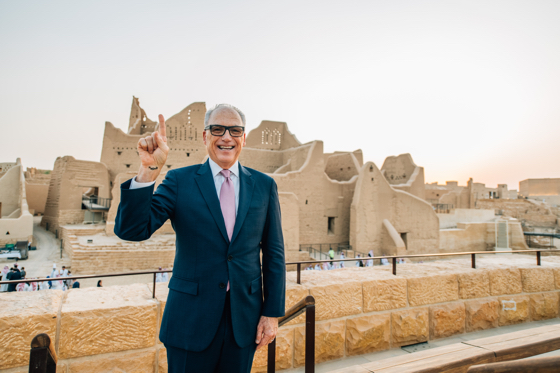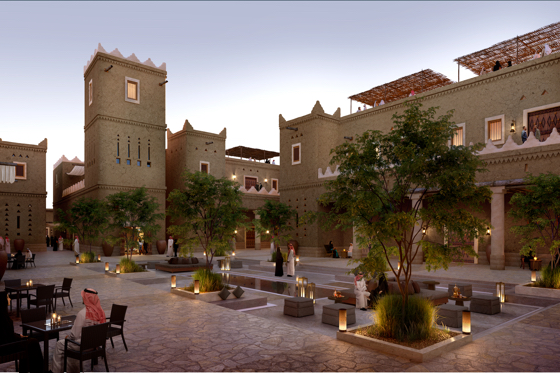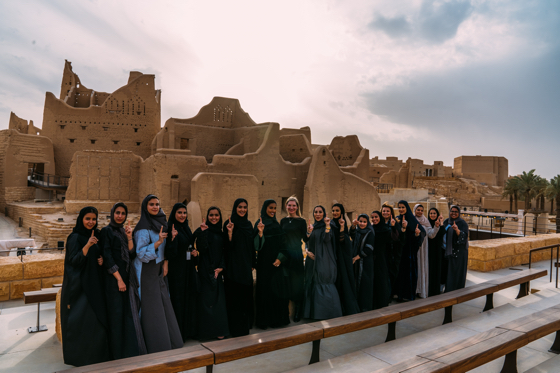You don’t often see the words Riyadh and razzmatazz in the same sentence. But as the Kingdom of Saudi Arabia embarks on a 10-year plan to grow tourism to 10% of GDP from 3%, its shrewd royal family almost two years ago called on one of the last remaining showmen in the hotel business, the always vivacious Jerry Inzerillo, to help them realize their goal.
“Steve Wynn said, ‘Jerry is one of the last razzmatazz guys of the generation,’” Inzerillo told HOTELS in a late July video interview with an ever-present wide grin on his face. “A lot of the showmanship of our industry has long dissipated. But I know how to put a place on a map. I want Saudi Arabia to get its recognition. I know it’s not going to be easy in terms of reversing an image, but we’re on our way.”

In a hotel universe almost void of good news since the coronavirus outbreak began early this year, Saudi Arabia remains at least one bastion of opportunity and forward momentum. The Kingdom is jumping into the hotel business with both feet, planning to shovel 30 years of progress into the 10-year Vision 2030 plan with multibillion-dollar investments across the country. The plan initially focuses on Riyadh, Jeddah and the holy cities of Mecca and Medina.
Granted, the COVID-19 outbreak might extend the timeline by a few years but King Salman and Crown Prince Mohammed bin Salman are committed to the project as well as to moderating the Kingdom’s political ideology to welcome the world to what they believe is the next frontier of tourism.
To bring those plans to fruition, the royal family brought in one of the most positive thinkers in the hotel business in Inzerillo, who started his career some 53 years ago as a 13-year-old busboy at a New York City hotel. He remains the consummate showman and hotelier who loves to talk about the nobility of service.
Inzerillo spent nine years with Hilton and then several years in operations with Four Seasons (becoming GM at age 26), living Issy Sharp’s “Golden Rule” philosophy. He became the first president of Ian Schrager’s Morgans Hotel Group and in 1991 started a 20-year run with visionary Sol Kerzner, operating Sun City in South Africa and growing One&Only in the Middle East. He then detoured for three years to become CEO of the famed IMG Artists management company, and most recently as the always smiling face of Forbes Travel Guide.
The big project Inzerillo is heading now, the US$20 billion Diriyah Gate Development Authority (DGDA), marks the beginning of construction and transformation for Diriyah, a city within Riyadh province that is expected to house 100,000 residents and attract 25 million annual visitors.
The original capital of Saudi Arabia will be transformed into a 7-square-kilometer lifestyle destination for culture and heritage, hospitality, retail and education, including some 20 hotels and the preservation of the At-Turaif UNESCO World Heritage Site, which sits at the heart of the development. The Najdi-inspired Diriyah Gate reflects the Najdi architecture of 300 years past, newly adapted for 21st century living.

Ground-breaking and construction work has now commenced, beginning with Bujairi, which will be the first of several areas of Diriyah to experience a major upgrade with a premium dining hub and a 142-key Samhan Heritage Hotel.
This project is part of a much bigger plan. In June, Saudi launched a US$49 billion Tourism Development Fund, made up of an initial US$4 billion in capital and a further US$45 billion in MoUs with private banks. The fund will support flagship mixed-use and hospitality developments, grow domestic and international tourism, and attract foreign direct investment.
Other major destination projects in the pipeline for Saudi include the Red Sea Project with 18 hotels and resorts. The 28,000-square-kilometer development, including an archipelago of more than 90 islands, recently broke ground between the cities of Umluj and Al Wajh. NEOM, a 26,500-square-kilometer, technology-based, sustainable mega-city in the northwest of the country is supposed to be 30 times larger than New York City and has a US$500 billion initial budget. Phase one of the project, completed in mid-2019, included an airport and several residential districts, but there are questions about whether the original completion date of 2025 remains realistic.
Over the next 10 years, the country intends to increase visitation to 100 million per year, which will be aided by the September 2019 introduction of e-visas for non-religious tourists from 49 countries. More than 77,000 tourist e-visas were issued over the first 33 days, according to the Saudi Ministry of Foreign Affairs.
“You won’t have a contraction of the market here,” Inzerillo said about the strength of the opportunity in KSA. “Every development director is going to come to Saudi. And there is mitigated risks, too, because there are guarantees — either equity or operating guarantees, as well as subsidies that the Saudi development fund will give. That’s a big thing.”
Chopping wood at 66
Call this the last great project for the legendary Inzerillo, and at age 66 he is being pushed to the max with up to 100-hour work weeks, many of which come late at night in a society known for its nocturnal leanings. And, noteworthy, he is doing his job with a 400-plus person team, of which 36% are women with 16% in management.
“As an innkeeper, I’m finding a great willingness to learn, and these young Saudis love their hotel business,” Inzerillo said. “There is very little expertise here. So, it’s going to take an enormous amount of training.”

That said, he sees the major branded hotels already open in Riyadh starting to bring their better GMs to the market as it opens further and attracts more heads of state and international visitors. “People want to work here now. So, it’s not like, ‘Oh, I don’t want to go to Saudi Arabia.’ It’s like what Dubai was in the early ’90s, or Hong Kong was in the ’70s and ’80s.”
Personally, he is finding the Saudis very welcoming, even if he barely sees the light of day. “It’s difficult, because the Crown Prince works an 80-hour week. At this point in my career, to work a 100-hour week is demanding.”
But when you get a phone call from the king, that’s a big deal. “You better get it right. When you get a phone call from the Crown Prince, who is going to be king, you better get it right. You’re not going to make mistakes on his watch. He is as tough a CEO as I’ve ever met,” Inzerillo explains.
Demanding yes, but stimulating, too, if not exhausting. Inzerillo counts the Crown Prince among his favorite bosses — very decent, good to his word, very smart, very visual. “I’ve lived all over the world. I had to operate in Asia, Africa, in the Middle East. At this point, I’ll be 67 in April, to chop wood 100 hours a week the way I did when I was 37 — it’s not the same movie.” But there appears to be no stopping this high-energy hotelier.
A typical day for Inzerillo is a late day. “Throughout my 50-year career, I’ve always been a six-day-a-week guy,” he said. “All my loved ones have always known, we get him one day a week, but at least dad doesn’t work, or Jerry doesn’t work … I never take work home with me. Here, I do.”
He gets up at 7 a.m., walks on a treadmill and is in the office by 9 a.m. His staff will get in by 10 a.m., but it is very common for the team to work till 2, 3, 4 o’clock in the morning.
“The days off here are Friday and Saturday. This Friday I spent a lot of time with matters related to the Crown Prince, starting at 1 p.m. and finishing at 11:30 p.m.,” Inzerillo said. “Then Saturday, I was on site inspecting, where we have over 1,000 pieces of equipment… I’m on site at least 90 to 120 minutes a day, because it’s 190 kilometers.
“You know me, I’m old school. I like shaking hands. Now, with COVID you can’t. You do the elbow bump, or wave, or do the namaste. I like being around my team, and when the work week starts on Sunday I get all 400 together and give them a pep talk about what we have to accomplish for the week. And then every Thursday before they break for the weekend, I congratulate them.”
Inzerillo the diplomat
When coming to work in the KSA a hotelier might expect some surprises, but such has not been the case for Inzerillo. He said over the last three to five years the negative perceptions of the Kingdom have been dissipating as leadership slowly opens society to wider norms.
“When you come here, people are so surprised how nice people are,” Inzerillo said. “Now, is it Dubai? Well, we don’t have alcohol yet. Whether or not that will change in the future, most likely. It’s a very warm place. The biggest surprise is how genuine the society is and how incredibly detailed the Crown Prince is. He approves every rendering. He approves every design. To have a boss with that aesthetic, that drive, that interest is great because he has given me everything I’ve asked for since I’ve been here.”
But in every new placement, adjustments to style and philosophy are the norm. For Inzerillo, the KSA has been a bit easier of a change. “The Saudis are unbelievably polite. They’re unbelievably family-oriented. If you do not start a conversation without a greeting, as-salamu alaykum, and you do not ask someone how their family is, they will not be offended. But they will not treat you as their own.”
Meetings require much diplomacy and respect to the royal family, according to Inzerillo. “You have to be a superb listener due to the complexities of working within a government authority,” he added. “You have to work inter-ministerially. You have to behave like an entrepreneur, even though you’re in a government agency.”
Acting like a maven will get you nowhere, Inzerillo added. “Now, there have been experts that have come in here saying ‘it’s my way. I’m here to do a job. I’m not here for the niceties.’ They very rarely make it more than a year, and then they’re out.”
And forget about being a 6 a.m. Palo Alto kind of leader. “You’re going to be bumping into us when you’re waking up, we’re coming home,” Inzerillo jokes. “If you’re a morning person, this is not the right place to accept the CEO job.”

